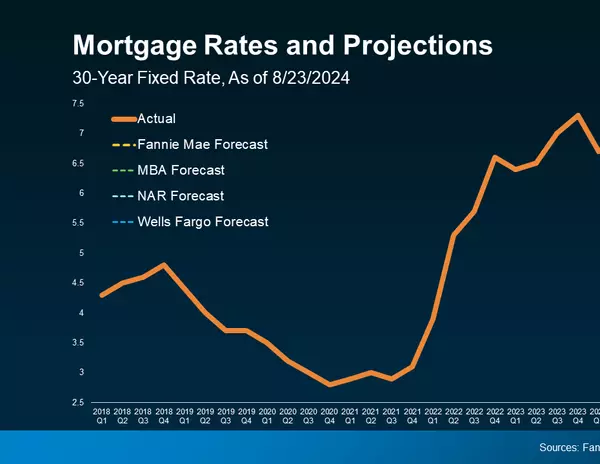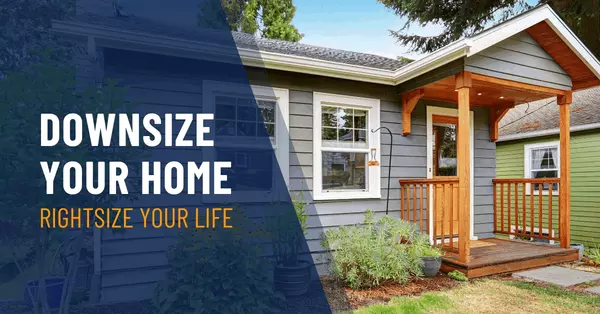
Top 7 Tips To Attract the Best Offers for Your Home
Not long ago, home sellers were in their heyday, as historically-low mortgage rates triggered a real estate buying frenzy. However, the Federal Reserve shut down the party when it began raising interest rates last year.1 Now, it’s not as simple to sell a home. While pandemic-era homebuyers were racing the clock—trying to lock in a low mortgage rate and gain a foothold in the market—current buyers are more discerning. Higher prices and mortgage rates have pushed their limits of affordability, leading them to prioritize cost, condition, and overall value.2 The reality is, home inventory remains low, so most properties will still sell with some basic prep, the right price, and a good real estate agent. But owners who go the extra mile are more likely to sell faster and for a higher amount. If you have plans to sell your home and want to net the most money possible, this list is for you. Here are our top seven strategies to attract the best offers and maximize your real estate returns. 1. UNDERGO A PRE-LISTING INSPECTION Many homebuyers hire a professional to complete a home inspection before they close. But did you know that a seller can order their own inspection, known as a pre-listing inspection, before they put their home on the market? Having a pre-listing inspection on hand and ready to share shows interested buyers that you’re committed to a transparent transaction. This can help you market your home, strengthen your negotiating position, and minimize roadblocks to closing.3 Of course, it’s always possible that a pre-listing inspection—which looks at the home’s major systems and structures, among other things—could turn up a significant problem. This does carry some risk, as you’ll be required to either fix or disclose any issues to potential buyers. However, in most cases, it’s better to know about and address deficiencies upfront than to find out mid-transaction, when it could cost you more in the form of concessions, a delayed closing, or a canceled sale. We can help you decide if a pre-listing inspection is right for you. And if it identifies any concerns, we can advise on which items need attention before you list your home. 2. CONSIDER STRATEGIC UPGRADES Embarking on major renovations before putting your home on the market doesn’t always make financial (or logistical) sense. However, certain upgrades are more likely to pay off and can help elevate your home in the eyes of buyers. For example, refinishing hardwood floors results in an average 147% return on investment at resale and new garage doors typically pay for themselves.4 Similarly, research shows that professional landscaping can boost a home’s value by as much as 20%.5 Often, even simpler and less expensive fixes can make a big difference in how your home comes across to buyers. A fresh coat of paint in a neutral color, modern light fixtures and hardware, and new caulk around the tub or shower can help your property look its best.5 But before you make any changes to your home, reach out. We know what buyers in your neighborhood are looking for and can help you decide if a particular investment is worthwhile. 3. HIRE A HOME STAGER To get standout offers, you need potential buyers to fall in love with your home—and they’re much more likely to do so if they can envision themselves in the space. That’s where home staging comes in. Staging can include everything from decluttering and packing away personal items to bringing in neutral furniture and accessories for showings and open houses. According to the National Association of Realtors, home staging can both increase the dollar value of home offers and help a property sell faster. In fact, 53% of seller’s agents agree that staging decreases the amount of time a home spends on the market, and 44% of buyer’s agents see higher offers for staged homes.6 There’s plenty of strategy and research behind the process, so it’s smart to consider a professional. Reach out for a connection to one of our recommended home stagers who can help your property show its full potential. 4. EMPLOY A COMPETITIVE PRICING STRATEGY While it’s tempting to list your property at the highest possible price, that approach can backfire. Homes that are overpriced tend to sit on the market, which can drive away potential buyers—and drive down offers.7 Alternatively, if you price your home competitively, which is either at or slightly below market value, it can be among the nicest that buyers see within their budgets. This can ultimately lead to a higher sales price and fewer concessions. To help you list at the right price, we will do a comparative market analysis, or CMA. This integral piece of research will help us determine an ideal listing price based on the amount that comparable properties have recently sold for in your neighborhood. Without this data, you risk pricing your home too high (and getting no offers) or too low (and leaving money on the table). Combined with our local market insights, we’ll help you find that sweet spot that will attract the best offers while maximizing your profit margin. 5. OFFER BUYER INCENTIVES Sometimes, sweetening the deal with buyer incentives can help you get the best possible offer. Incentives are especially helpful in the current market, when many buyers are struggling with affordability and concerned about their monthly payments. Options that can pay off include: Buying down their interest rate – You can pay an upfront sum to reduce the buyer’s mortgage rate. This approach can save far more than that cost over the life of the loan, meaning it’s worth more to the buyer than a simple price reduction.8 Offering closing cost credits – You might pay a set amount or a certain percentage of the buyer’s closing costs. Paying HOA costs – You could cover homeowner association or condominium fees for a set period of time. Including furniture or appliances in the sale – If your buyer is interested, throwing in the furniture or appliances that they want and need can make your property more appealing. Buyer incentives vary and valuing them can get complicated. We’re happy to talk through the options that might make sense for you. 6. USE A PROVEN PROPERTY MARKETING PLAN Gone are the days when it was enough to put a “for sale” sign in your yard and place a listing on the MLS. A strategic marketing plan is now essential to get your home in front of as many interested and qualified buyers as possible. The truth is, buyers who don’t know about your house can’t make an offer. That’s why we utilize a multi-step approach to marketing that starts with identifying your target audience, effectively positioning your home in the market, and communicating its unique value. We then use a variety of distribution channels to connect with potential buyers and performance-based metrics to monitor and improve our campaign results. Our proven approach can have a big impact on the success of your sale. Reach out to learn more about our multi-step marketing plan and discuss how we can use it to generate interest and offers for your home. 7. WORK WITH AN AGENT WHO UNDERSTANDS YOUR AREA To get the best offers possible, you need a real estate agent who knows your area inside and out. Any agent can pull comparable sales data, but in a quickly-evolving market, even the latest comps can lag the current market reality. We have our fingers on the pulse of the local market because we’re working directly with sellers like you. We also represent local buyers who are active in the market, searching for homes like yours. That puts us in an ideal position to help you price your home for a quick sale and maximum profit. And since we hear first-hand what local buyers want, we can help you prep your home to broaden its appeal and highlight its most-coveted features. Additionally, we can use our extensive network of local agents to solicit feedback and get your home in front of more potential buyers. All of these factors can add up to a significant difference in your profit: In 2021, the typical home sold by owner went for $225,000 compared to a median price of $330,000 for agent-assisted home sales.9 LET’S GET MOVING Are you ready to get a great offer for your home? Our multifaceted approach can help you maximize your real estate returns. Reach out for a free home value assessment and customized sales plan to get started! *The above references an opinion and is for informational purposes only. It is not intended to be financial, legal, or tax advice. Consult the appropriate professionals for advice regarding your individual needs. Sources: U.S. Bank -https://www.usbank.com/investing/financial-perspectives/investing-insights/interest-rates-impact-on-housing-market.html National Association of Realtors -https://www.nar.realtor/sites/default/files/documents/2023-home-buyers-and-sellers-generational-trends-report-03-28-2023.pdf Bankrate -https://www.bankrate.com/real-estate/prelisting-inspection/ National Association of Realtors -https://www.nar.realtor/sites/default/files/documents/2022-remodeling-impact-report-04-19-2022.pdf Bankrate -https://www.bankrate.com/homeownership/landscaping-increase-home-value/ National Association of Realtors -https://www.nar.realtor/infographics/staged-for-success The Balance -https://www.thebalancemoney.com/looking-twice-at-overpriced-homes-1798671 U.S. News & World Report -https://money.usnews.com/loans/mortgages/articles/a-guide-to-seller-paid-mortgage-rate-buydowns National Association of Realtors -https://www.nar.realtor/research-and-statistics/quick-real-estate-statistics

7 Common Homebuyer Regrets (And How To Avoid Them)
To avoid buyer's remorse, be sure to consider your future self when shopping for a home. Most new homebuyers don't regret becoming homeowners. In fact, according to a survey by LendingTree, 80% of recent buyers who successfully overcame a challenging housing market say they're glad they found their current homes.1 But that doesn't mean newly-minted homeowners don't have any regrets about their buying choices. On the contrary, research shows that even the most-satisfied homeowners would change some aspects of their home purchase if given the opportunity. According to a recent survey by Anytime Estimate, nearly 3 out of 4 buyers who purchased a home in 2021 or 2022 still have a few regrets.2 Some question their decision to move to a neighborhood they still don't love. Others wish they had been less picky about where they lived so they could have paid less. Many are afraid they overspent or think they sacrificed too much in their rush to buy a home. Here are some of the most common homebuyer regrets we see, along with our professional advice on how to avoid them. REGRET #1: Spending More Than Necessary No one wants to overpay for their new home purchase (and, luckily, with the right guidance, doing so is avoidable). But even if you've secured a winning purchase price, there are still plenty of ways to accidentally overspend. One of the most common ways to overpay? Choose the wrong mortgage. In fact, in today's higher-rate environment, this can be one of the riskiest mistakes a new buyer can make. According to a recent survey, for example, nearly three-quarters of homebuyers leave money on the table by not bothering to shop around for the best rate.3 And research by LendingTree suggests that buyers in major metro areas lose an average of $63,151 over the life of their loan just by picking the first mortgage they're offered.4 Lesson Learned: As long as you stick to what you can afford, buying a home can be a boon for your financial health. The longer you live in it, for example, the more your home is likely to appreciate in value and boost your long-term savings. But to get the most value from your purchase, it's worth your time to compare financing options and shop around for the best deal. We also recommend getting a mortgage pre-approval before you start your home search so you know what's within reach. We can refer you to one of our trusted lending partners for help. REGRET #2: Rushing Into a Home Purchase In a competitive housing market, it's often necessary to act fast to secure a home. But don't let a need for speed tempt you into making an offer before you've thought through or fully vetted a new property. Rushing into a home purchase isn’t just risky, it's also one of the most commonly cited sources of homebuyer regret. According to Anytime Estimate, for example, more than 1 in 4 homebuyers felt remorse over how quickly they sped through the home buying process.2 Getting swept away by your emotions can also lead to buyer's remorse. If you've found a home you love and are competing with other buyers, it can be tempting to overlook key details or bid more than you can afford. That's one reason it helps to have a skilled professional by your side to calmly guide you through the process and ensure you act with reason, rather than emotion. Lesson Learned: Buying a home is exciting. But if you don't keep your emotions in check or act too impulsively, you could make poor choices in the moment that are hard to undo later. To avoid making last-minute decisions that could backfire, know what you want, what you need, and what you can afford before you start your home search. We can help you set priorities so you’ll be able to move forward with confidence when the time is right. REGRET #3: Miscalculating the Costs of Homeownership Though real estate is a great long-term investment, it can be pricey in the short-term, often surprising homeowners who aren't prepared for it. According to some estimates, for example, annual maintenance could cost as much as 1% or more of your home's purchase price.5 Some buyers also forget to factor in additional ownership expenses, such as property taxes, insurance, and repairs. Failing to think through the costs of homeownership is one of the most common sources of homebuyer regret. According to Anytime Estimate, for example, nearly half of the homebuyers who regret their purchase said they underestimated how much they would spend to live in it.2 However, some homes cost more to live in and maintain than others. So even if you're certain that you can afford the average cost of homeownership, that doesn't necessarily mean that every home in your price range will fit neatly into your budget. For example, very old homes with unique maintenance requirements could be extra pricey to keep up. Similarly, homes with high HOA or condo fees could also eat into your monthly budget. Lesson Learned: A home should help you build your wealth, not drain it. So it's important to factor in all the potential costs of living in a home—not just obvious ones like your mortgage payment and taxes. To ensure you don't get overextended, add up your estimated maintenance and repair costs, as well as any miscellaneous expenses that are unique to a particular home. We can help you with these estimates—and, if needed, present you with some less-costly alternatives. REGRET #4: Underestimating the Time Required To Maintain or Renovate a Home One of the most joyful aspects of homeownership is getting to relax in a home that's all your own. But if a home is too high maintenance, then you may not have time to savor it. Many homeowners love to spend their weekends puttering in their gardens or undertaking home improvement projects. But if that's not you, then you may not like living in a home with a big yard or with high-maintenance features, like a pool. According to a survey by Hippo, for example, 47% of homeowners who feel some regret about their home purchase complain that too much maintenance and upkeep is required.6 Similarly, buyers who purchase fixer-uppers are often surprised by how much time it takes to rehab their new homes. Although buying a fixer-upper is a great way to save on the purchase price, you could come to resent it if it eats up all your free time. Lesson Learned: Renovation and maintenance projects are often time-consuming and stressful. So beware of committing to a property that requires too much of your attention if you don't have the time or patience for it. With that said, home improvement projects can also bring a lot of joy and satisfaction to owners who like rolling up their sleeves. We can talk through the realities of homeownership with you and help you choose a property that will fit your personality and schedule. REGRET #5: Ignoring or Skipping a Home Inspection It’s easy to get swept up in the excitement of buying a home. Sometimes, buyers will agree to skip a home inspection to sweeten their offer in a competitive market. They may also be tempted to pinch pennies since they’re already facing a large outlay. However, if you skip out on a home inspection, you could come to regret it. When you hire a home inspector, you get a professional, in-depth examination of the property’s structures and systems before you buy it. It’s a worthwhile investment that can save you money in the long run, either by warning you away from a bad purchase or by providing a list of deficiencies you can use to negotiate with the sellers. But even the most thorough home inspection isn't going to be worth much if you don't take the time to carefully consider it. If at all possible, make sure you’re on-site during the inspection so you can observe and ask questions. And don’t forget to re-evaluate any repairs that the seller agrees to make to ensure they’ve been properly completed prior to closing. Lesson Learned: A home inspection can reduce your risk and save you money in the long run. But to maximize its effectiveness, you will need to be an active participant in the process. We’d be happy to share a list of experienced and trustworthy home inspectors in our area. And when the inspection report is complete, we can help you decide if the purchase is worthwhile and negotiate any relevant seller concessions and repairs. REGRET #6: Choosing a Home That Doesn't Fit Homeownership is often a better investment if you’re willing to stay put for at least five years.7 But if your newly purchased home isn’t a good fit, then you may not want to stick around that long. Many homeowner complaints come down to simple lifestyle issues: Although a mismatch may seem small at first, the problems can magnify if you make so many compromises that they interfere with your quality of life. Or, sometimes homebuyers can fall in love with a beautiful home and forget about practicalities. For example, a stunning kitchen can’t replace a needed bedroom or bathroom. And a sparkling pool may sit empty if the home requires a lengthy commute to your office. Make sure you set some guardrails during your home purchase so you don’t over-compromise or accidentally prioritize your wants over your needs. Lesson Learned: When you’re dealing with limited inventory or a fixed budget, it may be necessary to sacrifice some items on your home wish list. But if you fail to secure your must-haves, you could come to regret your home choice. We can help you avoid an ill-fitting home purchase by working with you to set (and stick to) priorities and parameters before you begin your search. REGRET #7: Purchasing Without Professional Help Another path to homebuyer regret? Foregoing the expert guidance and market insight that you can only get from a licensed real estate agent. Buying a home without professional representation can be extremely risky. Therefore, it’s no surprise that 86% of buyers enlist the help of an agent when purchasing a home. And the vast majority find their assistance to be invaluable: 89% say they would use their agent again or recommend them to others.8 Real estate is hyperlocal and extremely fluid—especially these days when the market is in constant flux. So it pays to have a knowledgeable expert by your side who can guide you through an often-complicated process. We can help you avoid expensive mistakes that could lead to buyer’s remorse, all while making your home purchase as seamless and stress-free as possible. And since the home seller typically pays our commission, there’s no added expense for you! Lesson Learned: When you work with a real estate agent, you benefit from a wealth of expertise and on-the-ground insight that you can't get anywhere else. We’ll help you steer clear of the missteps that so many homebuyers make, so you can focus on enjoying your new home instead of questioning your choices down the road. The best part? Since the majority of home sellers pay us a commission at closing, in most cases, we offer our invaluable guidance and assistance at no additional cost to you! BOTTOMLINE No one wants to look back on their home purchase and realize they made a big mistake. We can help you avoid the pitfalls so you can buy with confidence. To learn more about how we work to ensure our clients’ satisfaction, reach out today to schedule a free consultation. *The above references an opinion and is for informational purposes only. It is not intended to be financial, legal, or tax advice. Consult the appropriate professionals for advice regarding your individual needs. Sources: LendingTree - https://www.lendingtree.com/home/mortgage/homebuying-process-survey/ Anytime Estimate - https://anytimeestimate.com/research/american-home-buyers-2022/ Zillow Home Loans -https://zillow.mediaroom.com/2022-11-18-Prospective-home-buyers-spend-about-as-much-time-researching-new-TVs-as-they-do-mortgage-lenders LendingTree - https://www.lendingtree.com/home/mortgage/mortgage-shopping-study/ CNBC - https://www.cnbc.com/2022/05/01/survey-majority-of-homeowners-have-regrets.html Hippo -https://www.hippo.com/blog/2022-hippo-housepower-report-how-homeowners-are-responding-essential-maintenance-during Realtor.com - https://www.realtor.com/advice/sell/how-soon-can-you-sell-a-house-after-buying/ National Association of Realtors -https://www.nar.realtor/research-and-statistics/research-reports/highlights-from-the-profile-of-home-buyers-and-sellers#homebuyers

Renovate or Relocate? 3 Questions to Help You Decide
Does your current home no longer serve your needs? If so, you may be torn between relocating to a new home or renovating your existing one. This can be a difficult choice, and there’s a lot to consider—including potential costs, long-term financial implications, and quality of life. A major remodel can be a major commitment. From hiring contractors to selecting materials to managing a budget, it can take a tremendous amount of time and energy—not to mention the ordeal of living through construction or relocating to a temporary residence. On the other hand, moving is notoriously taxing. In fact, in one survey, 40% of respondents viewed buying a new home as ”the most stressful event in modern life.”1 So which is the better option for you? Let’s take a closer look at some of the factors you should consider before you decide. 1. What Are Your Motivations for Making a Change? It’s possible that some of the limitations of your current home can be addressed with a renovation, but others may require a move. Renovate Certain issues, like dated kitchens and bathrooms, are fairly easy to remedy with a remodel—and the results can be dramatic. In many cases, a relatively minor renovation can significantly increase your enjoyment of your home. Other shortcomings can be more challenging to fix but are worth exploring so that you know your options. For example, if your home feels cramped or it lacks certain rooms, you might be able to make changes like installing an extra bathroom, adding a dedicated office, or finishing an attic or basement. You may even be able to build an accessory dwelling unit or extension to accommodate a multi-generational family. In fact, many Americans have remodeled their homes to meet changing needs since the start of the pandemic. According to the National Association of the Remodeling Industry, 90% of their members reported increased demand for renovations starting in 2020, and 60% reported that the scale of remodeling projects has grown.2 However, the feasibility and cost of these larger changes will depend on factors ranging from zoning and permitting to your home’s current layout. Speaking with an architect or a contractor can help you make an informed decision. Let us refer you to one of our trusted partners to ensure you receive the best possible service. Relocate Of course, sometimes, even rebuilding your home from the ground up wouldn’t solve the problem. For example, moving may be the only solution if you’ve switched jobs and now face a lengthy commute or if you need to live closer to an aging family member. Conversely, if the shift to remote work has opened up your location options, you may wish to seize the opportunity to relocate to a new locale. A 2022 study found that nearly five million Americans had already moved since the start of the COVID-19 pandemic due to increased flexibility from remote work, and nearly 19 million more were planning to move in the near future for the same reasons.3 Moving may also be the best option, even when you’re happy with your geographic location. A local move may make sense if you’re looking for a larger backyard or significantly more space. Similarly, some frustrations—like living on a busy street or a long way from a grocery store—can’t be addressed with a renovation. We are well-versed in this area and can help you determine whether another neighborhood might suit you and your family better. 2. Which Option Makes the Most Financial Sense? Renovating and relocating both come with costs, and it’s wise to explore the financial implications of each choice before you move forward. Renovate The costs of a renovation can vary widely, so it’s vital to get several estimates from contractors upfront to understand what it might take to achieve your dream home. Be sure to consider all of the potential expenditures, from materials and permits to updates to your electrical and plumbing systems. It’s also prudent to add 10-20% to your total budget to account for unexpected issues.4 If you plan to DIY all or part of your renovation, don’t forget to factor in the value of your time. Renovations can also come with hidden expenses. These might include: Additional home insurance Short-term rental or hotel if you need to move out during the renovation Storage unit for possessions that need to be out of the way Dining out, laundry service, and other essentials if you can’t access appliances at home Remodeling choices can also impact the long-term value of your home. Some projects may increase your home’s value enough to outweigh your investment, while others could actually hurt your home’s resale potential. For example, although you may enjoy the additional living space, garage conversions aren’t typically popular with buyers.5 Refinishing hardwood floors, on the other hand, brings an average return of 147% at resale.2 The specific impact of a renovation will depend on a number of factors, including the quality of work, choice of materials, and buyer preferences in your area. We can help you assess how a planned project is likely to affect the value of your home. Relocate The cost of a new home, of course, will vary significantly depending on the features you’re seeking. However, you may find that it’s cheaper to move to a home that has everything you want than it is to make major changes to your existing one. For example, adding a downstairs bedroom suite or opening up a closed floor plan could cost you more than it would to buy a home that already has those features. On the other hand, simpler changes and updates probably won’t outweigh the expense of a relocation. If you’re considering a move, speak with a real estate agent early in the process. We can assess your current home’s value and estimate the price of a new home that meets your needs. This will help you set an appropriate budget and expectations. It’s important to remember that the cost of buying a new home doesn't end with the purchase price. You’ll also need to account for additional expenditures, including closing and moving costs and the fees involved with selling your current home. And don’t forget to compare current mortgage rates to your existing one to understand how a different rate could impact your monthly payment. However, keep in mind that the interest rate on a mortgage is typically lower than the rate on other loan types—so you could pay less interest on a new home purchase than you would on remodel.6 We’re happy to refer you to a lending professional who can help you explore your financing options. 3. Which Option Will Be the Least Disruptive to Your Life? A final—but critical—consideration is the time and hassle involved with each option since both renovating and relocating involve a significant amount of each. Renovate Don’t underestimate the time and effort involved in a large-scale renovation, even if you choose to hire a general contractor. You will still need to consider and make a number of decisions. For example, even a fairly basic kitchen remodel can involve a seemingly-endless selection of cabinets, tile, countertops, paint colors, fixtures, hardware, and appliances. And don’t assume that you will get out of packing and unpacking if you stay in your current home. Most renovations—from kitchens to bathrooms to flooring replacement—require you to remove your belongings during the construction process. The time frame for a remodel is another consideration. High demand for contractors and ongoing material shortages can mean a long wait to get started. And once the project is in progress, you can expect that it will take a couple of weeks to several months to complete.7 Contemplate whether you will be able to live in your home while it’s being renovated and how that would impact your routine. For example, being without a functional kitchen for months can be frustrating, inconvenient, and expensive (since you’ll need to purchase prepared food). Remember that delays are inevitable with construction, and consider what additional challenges they could present. Relocate Of course, finding a new home and selling your current one also takes a significant amount of time and energy. According to the National Association of Realtors’ 2022 Profile of Home Buyers and Sellers, the average buyer searched for 10 weeks and toured a median of five homes.8 However, in many cases, the timeline can still be shorter than a major renovation. Once you find a home that works for you, it typically takes between 30 and 60 days to close if you’re taking on a mortgage—and the process is even faster if you’re paying with cash.9 Plus, you can look for your dream home without the inconvenience of living in a construction zone. However, a move comes with its own stress and disruptions. If you’re selling your current home, you’ll need to prep it for the market and keep it ready and available for showings. Once you’ve found a place, the packing and moving process takes time and work, as does settling into a new home—especially if it’s in a different neighborhood. Fortunately, we are here to help make the moving process as easy as possible, if you choose to pursue that route. We can help you find a property that meets all your needs, sell your current one for top dollar, and refer you to some excellent moving companies that can help pack and transport your belongings. WHATEVER YOU DECIDE, WE CAN HELP The decision to renovate or relocate can be overwhelming—but this choice also presents a powerful opportunity to improve your quality of life. There’s a lot to consider, from how renovations could impact your home’s resale value down the road to your neighborhood’s current market dynamics. We’re happy to help you think through your options. Get in touch for a free consultation! *The above references an opinion and is for informational purposes only. It is not intended to be financial, legal, or tax advice. Consult the appropriate professionals for advice regarding your individual needs. Sources: HousingWire -https://www.housingwire.com/articles/46384-americans-say-buying-a-home-is-most-stressful-event-in-modern-life/ National Association of the Remodeling Industry -https://cdn.nar.realtor//sites/default/files/documents/2022-remodeling-impact-report-04-19-2022.pdf?_gl=1*3pfs0m*_gcl_au*NTU2MDQ0MzAyLjE2ODMyMzgzMTY Business Insider -https://www.businessinsider.com/5-million-people-moved-because-of-remote-work-since-2020-2022-3 Forbes -https://www.forbes.com/home-improvement/contractor/home-renovation-costs/ U.S. News & World Report -https://realestate.usnews.com/real-estate/articles/10-home-renovations-that-can-decrease-the-value-of-your-home Bankrate -https://www.bankrate.com/mortgages/mortgage-vs-home-equity-loan/#differences House Beautiful -https://www.housebeautiful.com/home-remodeling/a25588459/home-renovation-timeline/ National Association of Realtors -https://www.nar.realtor/research-and-statistics/research-reports/highlights-from-the-profile-of-home-buyers-and-sellers Forbes -https://www.forbes.com/advisor/mortgages/how-long-does-it-take-to-close-on-a-house/
Categories
Recent Posts











